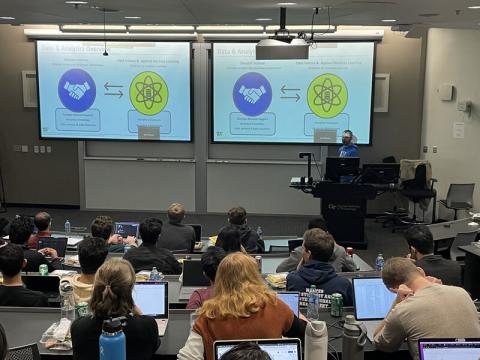By Shelley Wunder-Smith
Every spring, the students enrolled in Georgia Tech’s Master of Science in Analytics (MSA) program participate in a week-long team-based exercise that — by the project’s end — has given them real-world experience in solving a data science problem from start to finish.
Last March, a record 21 teams wrangled data, created models, and analyzed findings to provide actionable insights and business recommendations. Project Week presented an opportunity for the students to practice using the academic analytics knowledge from their fall classes. Using a dataset provided by Best Buy, the 2023 Project Week sponsor, the groups were challenged to create a one-week forecast for slow-selling SKUs that prioritized both accuracy and speed.
“Best Buy is one of the largest electronic retailers in the U.S., and they manage their supply chain logistics with data analytics. Specifically, they optimize their supply chain by using a predictive model to determine future sales of every product (SKU). The company has found, however, that some SKUs, such as refrigerators and DSLR cameras, are not predicted well by the model, since sales for them are more sporadic,” explained Anamik Jhunjhunwala, who was part of Data Scientists on Discount, the first-place winning team.
“For the project, we were asked to design a weeklong predictive model for these problematic SKUs, keeping two factors in mind: 1) low error in prediction, and 2) quick runtime,” Jhunjhunwala continued. “Best Buy gave us sample data to train our model; later, they gave us test data, with which we validated our model’s efficiency. A big part of the project involved using the model to create business recommendations for Best Buy, as well as presenting this advice in a compelling storytelling format.”
Paul Jordan, a member of the second-place winning Scarce Prophets team, found the Project Week problem to be both engaging and challenging.
“It was interesting to devise a well-performing model for slow-selling SKUs, in spite of the fact that they are slow-selling,” he said. “Because of this factor, I initially thought the data would be too scarce to enable us to come up with any good model. We worked on improving the sales forecasting for the slow-selling SKUs; this included analyzing these SKUs and creating several models using various internal and external features to help predict sales.”
Previous Project Week challenges have included anomaly order detection and response (Opex Analytics, an outdoor apparel manufacturing company); creating a predictive algorithm that consistently, quickly, and accurately classifies business according to NAICS codes (Wells Fargo); and identifying features in raw cable spectral data that correlate with degraded service experience and lead to costly customer service transactions (Cox).
“Students have told us they like working on challenging problems that can’t necessarily be solved in one week,” said Ann Blasick, MSA director of career services and Project Week coordinator. “They also like projects that can be approached from numerous different angles and that require learning new skills, such as NLP [natural language processing], text mining, or predictive modeling.”
As the 2023 Project Week sponsor, Best Buy provided not only the data science problem and dataset, they also offered $5,000 in prize money and team mentors who held “office hours” during Project Week. The experience was a positive one for the company, and they are returning to sponsor this year’s Project Week.
“Best Buy not only gained fresh perspectives from the students but also strengthened our partnership with the Georgia Tech MSA program, which is an important goal for us as we expand our hiring in Atlanta,” noted Warren Hearnes (MSOR 1999, Ph.D. IE 1999), Best Buy’s vice president of data science and chief data scientist, and MSA Advisory Board member.
When asked for his main takeaway from the 2023 Project Week, Data Scientists on Discount team member Joshua Cantera shared, “This project was a great way to test the skills I learned over the course of my MSA studies. It’s one thing to know how to create a predictive model, but it feels a whole lot better to know that I can make a valid predictive model. I feel much more confident about starting a career in analytics now.”
1st Place, Data Scientists on Discount
Joshua Cantera
Joseph Geibig
Anamik Jhunjhunwala
Nikolaos Kavouras
2nd Place, Scarce Prophets
Paul Jordan
Ravi Teja Kolipakula
Sanchita Porwal
Suraj Shourie
3rd Place, Rehoboam
Xiang Li
Ajay Majmudar
Kien Tran
Shaojun Zhang
4th Place, Data Super Jackets
Timothy Cody
Shannon Isaacs
Emily Velez
Christina York
